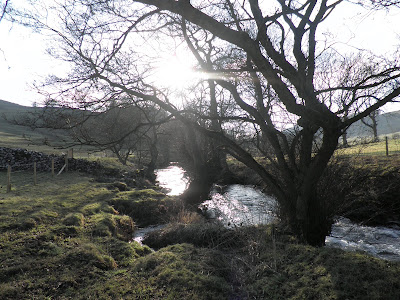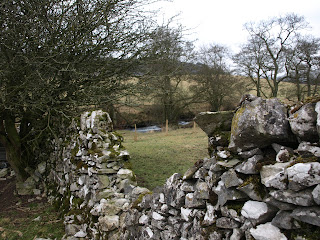River Dove, Peak District
The temperature is -3°C and cold as I stand at the crest of the ridge overlooking the river valley. There is just a hint of sunlight through the low lying grey clouds, but it’s fleeting and doesn’t cut through the biting north easterly wind. The cold stings my ears and cheeks and burns my lungs as I crunch my way over the hard, icy ground deeper into the valley, delicately avoiding the cattle manure. It’s a typical English winter’s morning. Grey, brown and black predominate in a countryside drained of colour and the trees are bare. There isn’t any sign of life other than a wisp of smoke lazily emerging from the chimney of the large stone farm house on the opposite side of the valley. I can hear the river now and see it through the bare branches of the alder trees and my anticipation levels rise.
And so began my first winter grayling fishing foray on the famous River Dove in the Derbyshire Peak District, the river immortalised by Izaac Walton and Charles Cotton. Cotton, in particular, in his contribution to Walton’s “The Compleat Angler” entitled “Instructions How to Angle for a Trout or Grayling in a Clear Stream” describes the river with evident fondness and its resident trout and grayling with glowing praise. It’s a river that oozes history.
But that’s where the romance ends... it just happened to be one of those days that comes along every now and again that has you wondering whether a major pollution incident wiped out the river’s life and someone forgot to mention it. I’ve come to realise that there are two distinct forms of ‘blanking’ in fishing, what I call the “near acceptable blank” and the “absolute blank”. The near acceptable blank still offers some meagre reward, if at the very least a sign that you almost did something right. Perhaps you managed to rise a fish only for a desultory last second, heart stopping snub of the dry fly, or perhaps you lost a fish only because you were too lazy to change the frayed tippet after getting it wrapped about the trees. It's enough to keep fishing conversation going over a few beers at sundown although granted, mostly phrased in the "what if?" and "if only" sense. I didn’t so much as see or feel a hint of a fish all day. The absolute blank. Alternative beer conversation required.
With the subzero temperatures thrown in it made for a pretty tough day. Having the fly line freeze to the rod guides was certainly a new experience!
I ran through numerous fly patterns (leaving a good portion of them on the tree branches), experimented with different depths when the tungsten bead heads didn’t deliver, increased the leader length, tried the deepest pools, fished the fast riffles and everything in between, all to no avail.
The sun appeared once or twice, bathing the valley in bright light but little warmth. A herd of sheep watched me suspiciously then forgot about me as I moved upstream. Somewhere over the hill a tractor noisily started up and then steadily faded into the distance. In the quiet solitude I pondered important, weighty issues: why were my hands warmer with wet gloves on than without any gloves at all? Had I damaged my teeth when biting into a frozen solid Mars bar? How did Walton and Cotton beat the winter cold in the 1600s? Eventually thoughts of a hot cup of tea overwhelmingly drowned out the rest and it was with some reluctance that I called it a day on this famous river.









Comments
Post a Comment
Thank you for taking an interest in my fishing diary. I appreciate your feedback.